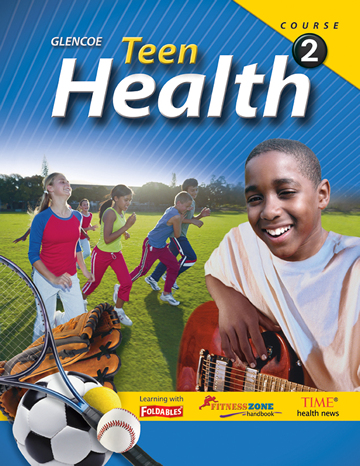Teen Health Course 2Chapter 10:
DrugsStudent Web Activities - Teacher ContentLesson 4 Answers - Neuron cells release neurotransmitters that send messages in the brain.
- Some drugs are similar to neurotransmitters and they lock into receptors to cause neurons to release large amounts of neurotransmitters, and some block receptors.
- Drugs can create an unnatural feeling of pleasure. Smoking drugs can cause coughing and nausea. Drugs cause neurons to reduce the amount of dopamine, and some neurons die.
- Abuse of drugs makes the user crave drugs to increase dopanine levels. Drug abuse can lead to long-term changes in the brain. Addicts lose the ability to control the way they use drugs.
- Drug addiction therapy can retrain the brain, and sometimes medication is used to treat addiction.
Additional Resources for Teachers The number and kinds of drugs available to teens is truly astonishing. The Web sites below can help you become informed about them and think of creative ways to help students understand the dangers.
- Phoenix House: http://www.phoenixhouse.org/
- American Council for Drug Education: http://www.acde.org/
- NIDA: http://www.nida.nih.gov/
- Life Skills Training: http://www.lifeskillstraining.com/
Lesson 5 Answers: - Continued drug use causes addiction that results in changes in your brain.
- It is difficult for people who are addicted to drugs to quit “cold turkey.” Most abusers require long-term, repeated treatment.
- Research shows that recovery takes a minimum of 90 days to have an effect.
- Characteristics of dependence include:
- Repeated use of alcohol or other drugs leading to failure to fulfill major responsibilities related to work, family, school or other roles
- repeatedly drinking or using drugs in situations that are physically hazardous, such as driving while intoxicated or using heavy machinery when intoxicated
- repeated legal problems
- Substance use can be addressed before it becomes an addiction or a dependence.
Additional Resources for Teachers There are many resources available that advocate for drug-free schools and communities. Encourage students to research more about reasons and strategies for avoiding substance abuse and find ways to spread the word about the importance of staying drug-free.
- Community Anti-Drug Coalitions of America http://cadca.org/tl-YA.asp
- Students Against Destructive Decisions http://www.sadd.org/links.htm
- FreeVibe http://www.freevibe.com/
- What’s Your Anti-Drug? http://www.whatsyourantidrug.com/
 | 
















